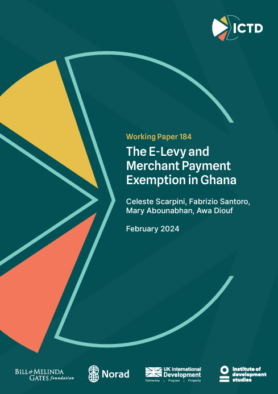Working Paper 184
In this paper we look into the increasing use of electronic payment technologies in low-income countries (LICs), with a particular focus on the use of mobile money in Ghana. Our study evaluates the effectiveness of tax exemptions for incentivising businesses and customers to adopt digital merchant payments, and shaping their perceptions of the tax system. Specifically, we investigate the impact of an exemption embedded in Ghana’s electronic transfer levy (e-levy), implemented in May 2022. Through a mixed-methods approach, involving survey data from 1,065 businesses and focus group discussions with Ghanaian citizens, we explore the barriers and drivers to merchants’ (businesses’) registration with mobile money for digital merchant payments. We assess the impact of the exemption on payment methods and customer preferences, as well as merchants’ perceptions of the tax system. Our findings highlight that larger digitally- and financially-inclusive businesses are more likely to adopt digital merchant payments. The exemption appears to have encouraged the use of mobile money for merchant payments, leading to a shift away from personal accounts. However, cash remains prevalent among both users and non-users of mobile money. Merchants using the exempted service express more satisfaction with various aspects of the e-levy policy, and show greater trust in the government and the fairness of the tax system. Our study offers valuable insights into the adoption of digital merchant payments in LICs, and the impact of tax exemptions on merchants’ behaviour and perceptions. We provide policy recommendations aimed at promoting the uptake of digital payments among merchants, and enhancing the effectiveness of the tax administration.
